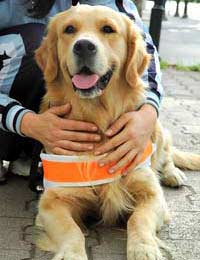Assistance Dogs For Extra Support

Assistance dogs come in all shapes and sizes! Some are family pets, some are specially trained rescue dogs and some are bred to do the work. One thing they all do though, is become friends and helpers to their human partners, giving those people greater confidence and more independence.
What do They do?
Assistance dogs can be trained to help in numerous everyday situations, by channelling their natural willingness. The dog’s skills are honed and adapted to the individual needs of the owner or client. Puppies are bred and trained to assist the blind/visually impaired client (guide dogs) and for the deaf/hearing impaired. Seizure alert dogs are able to detect their owner’s imminent epileptic seizures, and hence warn them to get to safety. These dogs stay with the person, during the fit, to protect them and assist them when the fit is over.Some of the most general tasks performed by assistance dogs include:
- Fetch/carry the telephone and other items
- Raise the alarm
- Call for an ambulance
- Open/close doors
- Load/unload washing machineOperate control buttons
- Act as physical support
- Accompany their owners shopping and so on.
How do They do it?
All assistance dogs must be properly socialised. Basic obedience training, by way of control exercises, is another of the early stages in training. For dogs who progress satisfactorily through the basics, the next, more advanced level, can begin.This includes additional intensive control exercises, like asking the dog to go and pick up an object and bring it back, close the door - by pulling on a piece of rope attached to the door handle - unload the washing machine with its mouth and other, more demanding, commands.
At this stage the dog will also need more advanced socialisation to assess its work capabilities when in public places.
Dogs are taught to ignore food, even when it’s in the most tempting situation! It is crucial that assistance dogs concentrate on their work and are not distracted by anything outside their area of job focus. Any lapse of concentration, no matter how brief, could be catastrophic for the person who relies on them for support.
Dogs are assessed throughout their training. Any concerns about whether the dog can cope with stress, its recovery rate if disturbed by any particular situations or events, or general demeanour will be addressed. Full behavioural and veterinary evaluations are made on all dogs that undergo this specialised training.
Where are They Trained?
There are residential training centres designed for the more advanced stages of training. Before they reach this level, dogs will undergo training at home with their owner, under the supervision of a designated trainer, or live and work with an approved ‘puppy walker/trainer’. These animals can usually be identified by the vest or coat they wear with the name of the training centre on it. They often say things like ‘Assistance Dog in Training’ on them and may carry a polite notice requesting that people do not distract them while they’re working. The dogs associate wearing their ‘work clothes’ with tasks.When a dog has reached the final stage of its ‘apprenticeship’ training continues in the home environment where the dog is to be placed. It is just as important that the dog and the person it’s trained to help get on! Other family members and existing assistance dogs that are being retired, for example, need to bond with the new dog for the partnership to fully succeed.


Re: Run your own Animal Shelter
I am looking to open my own combined veterinary practice and animal rescue to support animals in need, provide education to the…
Re: Run your own Animal Shelter
Hello guys, just came across this site and it warms my heart that there aren't many people willing to help these little guys.…
Re: Work With Horses: Becoming a Stablehand
Hey my names Ava and I just turned 14 a few days ago, I have lots of experience with both riding and handling horses…
Re: Run your own Animal Shelter
Hello I am live in birmingham and I really like to open rescue centre for animals . Please help me with the step by step
Re: Run your own Animal Shelter
Just read this. I was considering buying land with stables into a cat sanctuary and I didn't realise you have to approach a council…
Re: Run your own Animal Shelter
Hi all, I currently manage a children's home and love it but I have always wanted to care for animals. Can anyone help me to learn…
Re: Work with Farm Animals or on a Farm
Hi I'm from Bulgaria.I was looking a job for farms with animals.I have 1.5 years experience at pigs farm and 3 years for…
Re: Work as a Flying Groom
Hi there this is a useful article, however how do you actually go about finding employment in this role? Please advise. Best wishes Jon
Re: General Work Experience with Animals
I am currently in year 10 and I was looking into your placements as I will need one week of experience in July. I am…
Re: Run your own Animal Shelter
Hi I see there are like minded individuals who feel and know the need to help animals more so now than ever! It would be amazing if…